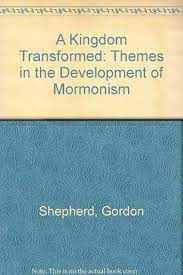Articles/Essays – Volume 19, No. 1
Mormonism from the Top Down | Gordon Shepherd and Gary Shepherd, A Kingdom Transformed: Themes in the Development of Mormonism
A Kingdom Transformed is required reading for anyone who may feel that statistical analysis can make only negligible contributions to the study of Mormon history and culture. Those who were already believers in the value of combining historical research and social science methodology should be encouraged by the work of Gordon and Gary Shepherd. While many of their conclusions about the themes developed in 150 years of General Conference addresses will not surprise well-versed students of the subject, the statistical verification of long-held assumptions can be comforting.
Since conference speakers have almost exclusively been General Authorities, grass roots historians may argue that this mono graph represents an intellectual history of the Mormon elite, not a true analysis of the development of Latter-day Saint history and culture. The Shepherds assert that Mormons’ “paramount belief in modern revelation” has made a systematic content analysis of official speeches a valid barometer of the composite mind of Mormonism (p. 3). They may well be right but the proof of such a thesis lies outside of their study.
The authors clearly take exception to some of the conclusions about Mormon authoritarianism by anthropologist Mark Leone in Roots of Modern Mormonism (1979). While Leone has argued that the apparent authoritarianism and doctrinal orthodoxy of the Latter-day Saints is but an illusion, the Shepherds contend that the official viewpoints, as highlighted by conference sermons, are vital to the religion (pp. 10-11). A major question raised by A Kingdom Transformed is whether the common religion of Mark Leone’s individual Mormons along the Little Colorado River in east central Arizona was but a shadow of the official, institutionalized dogma emanating from Salt Lake City. Further studies focusing upon local Mormon congregations would be required to answer this query.
The strength of this book is to be found in its various tables and figures. Even to a reader who gets lost in or is bored by the authors’ frequent discussions of sociological theory and theorists, the overall conclusions of the study, at least from a statistical standpoint, are clear. Mormon leaders were primarily concerned about Church government, persecution, and the enmity of non-Mormons during the first three decades of Latter-day Saint history. From about the 1860s to 1890, their concerns shifted to plural marriage, gentile antagonism, and obedience to gospel principles. Church (i.e. priesthood) authority and dedication to the gospel headed conference themes at the turn of the century, while missionary work and the divine nature of Joseph Smith’s prophetic calling were stressed between 1920 and 1949. Post-war emphases have featured Jesus Christ, parenthood, and missionary work (p. 76). The absence of comments on the family prior to 1950 seemed surprising, but no other listings were unexpected.
The methodology employed and the total concentration upon official rhetoric has, in some instances, tended to skew reality. For instance, even a cursory perusal of Mormon diaries and letters for the pre-Utah period will reveal that the Prophet Joseph Smith as well as many of his followers were quite interested in familiar relations. However, as the authors note, conference attention to this subject was “unremarkable” during the formative years of Mormonism (p. 87). The transformation of the Latter-day Saint religious institution from a small mid-nineteenth-century de nomination to a major late-twentieth century religion, and particularly the Church hierarchy’s response to the perceived needs of the believers is the intended purpose of A Kingdom Transformed. The book does go far toward accomplishing this; but future researchers most certainly will ask, as many currently are asking, whether the pronouncements of the General Authorities truly speak for all Mormons at all times.
A Kingdom Transformed: Themes in the Development of Mormonism by Gordon Shepherd and Gary Shepherd (Salt Lake City, Utah: University of Utah Press, 1984), 307 pp., $19.95.


 Back to full Issue
Back to full Issue

